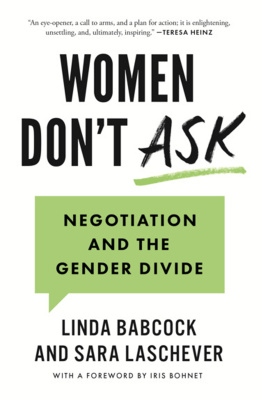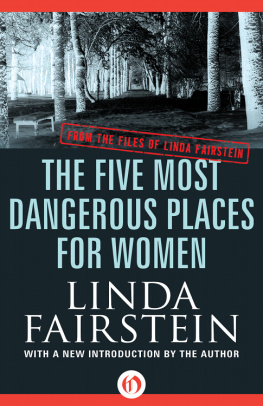Linda Babcock - Women Dont Ask
Here you can read online Linda Babcock - Women Dont Ask full text of the book (entire story) in english for free. Download pdf and epub, get meaning, cover and reviews about this ebook. year: 2020, publisher: Princeton University Press, genre: Business. Description of the work, (preface) as well as reviews are available. Best literature library LitArk.com created for fans of good reading and offers a wide selection of genres:
Romance novel
Science fiction
Adventure
Detective
Science
History
Home and family
Prose
Art
Politics
Computer
Non-fiction
Religion
Business
Children
Humor
Choose a favorite category and find really read worthwhile books. Enjoy immersion in the world of imagination, feel the emotions of the characters or learn something new for yourself, make an fascinating discovery.
- Book:Women Dont Ask
- Author:
- Publisher:Princeton University Press
- Genre:
- Year:2020
- Rating:4 / 5
- Favourites:Add to favourites
- Your mark:
- 80
- 1
- 2
- 3
- 4
- 5
Women Dont Ask: summary, description and annotation
We offer to read an annotation, description, summary or preface (depends on what the author of the book "Women Dont Ask" wrote himself). If you haven't found the necessary information about the book — write in the comments, we will try to find it.
Women Dont Ask — read online for free the complete book (whole text) full work
Below is the text of the book, divided by pages. System saving the place of the last page read, allows you to conveniently read the book "Women Dont Ask" online for free, without having to search again every time where you left off. Put a bookmark, and you can go to the page where you finished reading at any time.
Font size:
Interval:
Bookmark:

WOMEN DONT ASK

[A] great resource for anyone who doubts there is still a great disparity between the salary earnings of men and women in comparable professions.
Publishers Weekly
Women Dont Ask goes beyond well-known facts and offers concrete tips on how women can remedy the underlying problems and actually move ahead.
ALLISON NAZARIAN, Foreword
Women Dont Ask crisply describes the results of one study after another, fitting the puzzle pieces together to show how and why women are held backand hold themselves backfrom advancing both financially and in every other way.
E. J. GRAFF, Womens Review of Books
In this brilliant book, Linda Babcock and Sara Laschever provide readers with the means not only of navigating the difficulties of negotiation, but also of fully engaging a modern world where traditional roles and norms are receding and business dealing has become more important.
ROBERT J. SHILLER, Nobel Laureate in Economics
Women Dont Ask helps women learn how to communicate their desires. This is absolutely essential and basic information since we cant read brainwaves. Speak up or surrender your goals!
PATRICIA SCHROEDER, former U.S. Congresswoman
This is an important study of how women can become their own best advocates by knowing how to ask for exactly what they want in their public and private lives.
HARRIET RUBIN, author of The Princessa: Machiavelli for Women
Women Dont Ask is a compelling and fresh look at the gender-in-negotiation question.
MAX H. BAZERMAN, author of The Power of Noticing: What the Best Leaders See
NEGOTIATION and the GENDER DIVIDE
With a foreword by Iris Bohnet
LINDA BABCOCK and SARA LASCHEVER
PRINCETON UNIVERSITY PRESS
PRINCETON AND OXFORD
Copyright 2003 by Linda Babcock and Sara Laschever
Foreword to the new paperback edition, copyright 2021 by Princeton University Press
Published by Princeton University Press, 41 William Street,
Princeton, New Jersey 08540
In the United Kingdom: Princeton University Press,
6 Oxford Street, Woodstock, Oxfordshire OX20 1TR
All Rights Reserved
First published by Princeton University Press in 2003
New paperback edition, with a new foreword by Iris Bohnet, 2021
Paperback ISBN 978-0-691-21053-7
Library of Congress Control Number: 2020947364
BRITISH LIBRARY CATALOGING-IN-PUBLICATION DATA IS AVAILABLE
This book has been composed in Berkeley Book
press.princeton.edu
Printed in the United States of America
For our children, Alexandra, Moses, and Adam, in the hope that they will grow up in a world more accepting of women who ask
by Iris Bohnet |
I am writing this foreword to one of my favorite books during a global pandemic that will continue to bring about lots of change in our society. It will also enhance the relevance of this book. As work arrangements become more idiosyncratic and flexible, careers less predictable, and job changes more frequent, we will more likely find ourselves in situations where we have to decide whether and how to negotiate. Similarly, with an increasing focus on diversity, equity, and inclusion (DEI), managers will have to think harder about how to level the playing field so that all can thrive in their organizations. Gender differences in pay and career advancement are well documented and, in some cases, have been attributed to gender differences in negotiation.
This book tells us why women are not asking for what they want and deserveat least not as often as men doand how they can do so more safely. Social role theory helps us understand why women are less inclined to initiate negotiations: they have been socialized to hold back, be warm and caring, and conform to the stereotypes we associate with a good woman. In contrast, men and boys have been taught to be assertive, to compete, and to take risksand to ask for what they need. We use different measuring rods when evaluating mens and womens behavior and punish norm violations. The world likes agentic men and communal women, and we adjust to these expectations because we want to fit in and be liked. As it turns out, when I was offered a job as an assistant professor at Harvard Kennedy School in 1998, I also did not ask. I just accepted the offer as presented because I feared negotiating would signal ungratefulness, greed, and lack of social competence.
Yes, social competence: reading the room, understanding an institutions values, and knowing your place. It is exactly in these weak situations filled with ambiguity that we fill in the blanks with stereotypical assumptions about ourselves and about others. Unfortunately, such situations abound. Think of the last time you completed a performance appraisal, either evaluating someone else or explaining your own accomplishments during the past year, possibly even assigning a rating. Everyone who has ever had to do this knows that despite companies best efforts to provide guidance, there is plenty of ambiguity in both self- and other-assessments.
In performance appraisals, women are inclined to give themselves lower ratings and tend to be evaluated more harshly by their managers than men. But not always. Oliver Hauser, Ariella Kristal and I recently concluded a study at a financial services firm that replicated the gender gap in self-evaluations: female employees generally assigned lower ratings to themselves. However, we also discovered that managers closed or even reversed that gap in some cases in their own appraisals. Much as I did when, in my role as academic dean at Harvard, I renegotiatedwith myselfa job offer to a female professor who did not ask. As is commonly the case, I had not put the schools very best offer forward to begin with, expecting that the prospective faculty member would demand certain adjustments. When she did not, I could have walked away proud of the great deal I had just struck. But because of this book, I did not walk. Instead, I made the adjustments myself to put her offer on par with that of her male colleagues who had asked. It surprised her a bit to receive a better offer unpromptedbut this is what it takes if we are serious about overcoming gender inequality and other injustices in our workplaces. We need to understand where the differences come from and take appropriate action.
Women Dont Ask helps us do both. Managers learn that they should not give an exciting assignment just to those employees who ask for it most. The quieter ones might be equally qualified and want it just as much. This is why Google, after discovering a gender gap in promotion applications, sent an explicit invitation to its technical employees asking them to self-nominate for promotion. This is also why we worked with a global company to develop the Gender Appointments Ratio, which helps managers track the outcomes of their actions. In spring of 2020, the company announced that it had achieved gender balance across all managerial roles globally. And while it is hard to isolate why exactly managers at the financial services firm mentioned earlier were able to close the gender gap in performance appraisals (as the firm pursued various strategies simultaneously), one likely explanation is its calibration meetings. During these meetings, male and female employees average ratings were compared, holding managers accountable for unexplainable gender differences.
Font size:
Interval:
Bookmark:
Similar books «Women Dont Ask»
Look at similar books to Women Dont Ask. We have selected literature similar in name and meaning in the hope of providing readers with more options to find new, interesting, not yet read works.
Discussion, reviews of the book Women Dont Ask and just readers' own opinions. Leave your comments, write what you think about the work, its meaning or the main characters. Specify what exactly you liked and what you didn't like, and why you think so.












